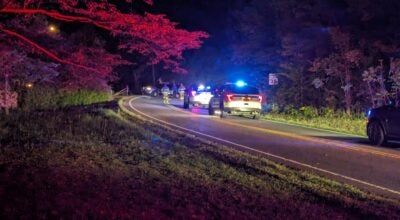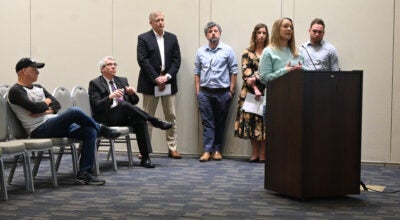Voter blows whistle on numbered ballots
Published 12:00 am Sunday, November 11, 2018
He was right on Election Day, but not on absentees
SALISBURY — Bill Reynolds says his rights have been violated.
As he prepared to vote on Tuesday, he saw a poll worker write a number on his ballot — the number from a form bearing his name.
To Reynolds, that meant someone could later look up his name, find out how he voted and retaliate, if they wanted.
“Somebody took away my rights — the right to have a private ballot,” Reynolds said in an interview on Wednesday.
Nancy Evans, director of elections in Rowan County, said Reynolds was right that poll workers were not supposed to number voters’ ballots on Election Day, and she made the workers at Reynolds’ precinct stop on Tuesday.
“I thank Mr. Reynolds for letting me know,” Evans said.
But she did not believe the poll workers had ill intentions. And an official with the State Board of Elections and Ethics Enforcement backed up her belief that Reynolds’ privacy was safe.
Patrick Gannon, public information officer for the state board, said ballots are secure.
“Ballots are confidential, and aside from elections officials performing their duties or through a court order, no one may have access to them,” Gannon said in an email to the Post. “… Knowingly disclosing a voted ballot or record of a voted ballot is a Class 1 misdemeanor.
“We are aware of no instances in recent memory where an election official violated this law in North Carolina.”
Evans said the numbering incident arose from the fact that poll workers are required to account for every ballot used, including those that are spoiled or provisional.
“That’s their concern, that they’re going to check up at the end of the night.”
The workers have no access to the completed ballots once they’re fed into the voting machine, Evans said. The machine is taken to the Board of Elections with the ballots sealed inside, she said.
“They’re trying to do the best they can,” she said. “There are certain laws to follow. … It was just an error. From now on, they’ll know better.”
However, there is a time when poll workers are supposed to number voters’ ballots in a way that can help identify them — on absentee ballots that are mailed in or cast during early voting.
The number from a voter’s “authorized to vote” form that bears his or her name is put on the ballot.
Half of the ballots cast in this fall’s elections came in early.
They are marked with the number on the voter’s form so that, if it’s discovered that someone voted both as an absentee and on Election Day, the Board of Elections can retrieve the person’s absentee ballot and remove it from the count, Evans said.
Theoretically, that means someone could find out how someone voted absentee. Again, Evans says that is not the motive. Election workers have to make sure every ballot is accounted for. “The integrity of the election is based on that. … People can win or lose by one vote, so we have to make sure everything’s right.”
Evans said training poll workers is not like it used to be, when everyone voted on Election Day. “There are so many different laws.”
Evans said Election Day 2018 produced 366 provisional ballots in Rowan, which is more than usual for a non-presidential year.
People showed up who hadn’t voted in years, and people also came from other counties who had been registered in Rowan at some time in the past, she said. There were also voters who said they registered at the DMV, but their names did not show up on the roll of voters.
“You cannot deny anybody the right to vote,” Evans said, so people are allowed to vote and their ballots are marked “P” for provisional until their eligibility can be checked out. But people don’t always accept poll workers’ explanations.
“Tensions were high on this one,” Evans said. “It really made you nervous, because you want people to have a good experience.”
Reynolds, the voter who questioned his numbered ballot, left his voting place at Isenberg Elementary School in a huff and was among those who showed up at the Board of Elections office — which is not a polling place — on Election Day.
He was relieved to learn that his ballot was not supposed to be numbered, and he wanted to spread the word through the Salisbury Post. He was the 323rd voter at Isenberg that day, and he believes all those who voted before him were numbered, too.
He wound up voting at the West Innes precinct at Knox Middle School where, he said, workers were surprised to learn his ballot had been numbered at the other precinct. He praised their work.
He said he had complained a few years ago about his ballot being marked in this way in an earlier election, too, and decided to skip the election after that. The midterm election brought him back to the polls.
He and others might not be happy, though, with Gannon’s reaction to one more question from the Post.
If the federal government subpoenaed early voting and mail-in absentee ballots, would the president and/or his appointees be able to identify individual voters and how they voted?
Gannon answered with two words: “Potentially, yes.”




